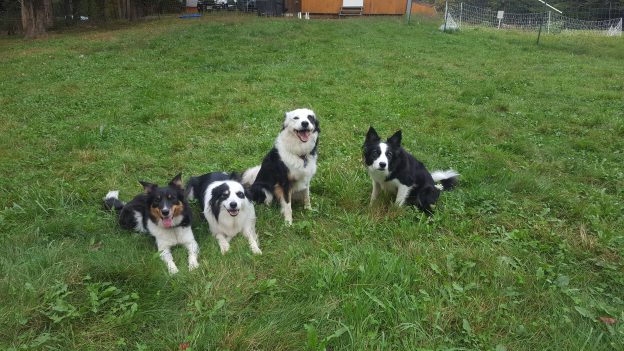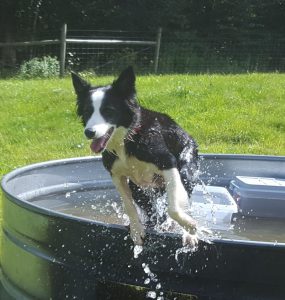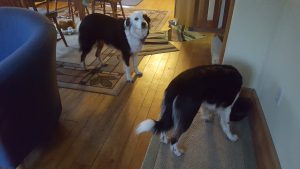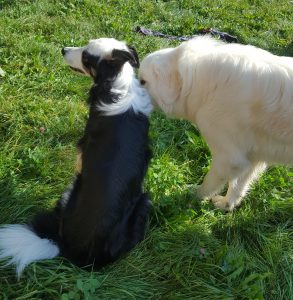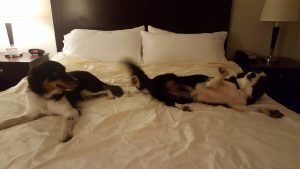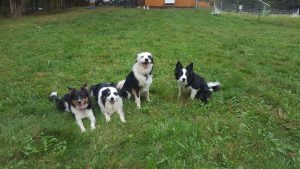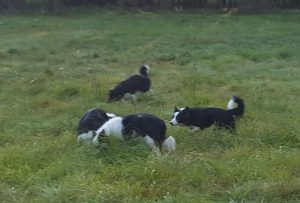In August we added a temporary household member. Jura was laid up and unable to work for me. And Breton the pup is far from ready to be “the” farm dog. So enter Kena, loaner dog extraordinaire. Kena comes from a friend who has 10 dogs. She is 7, well trained as a sheep dog and a love bug with people. She jumped right into her temp job as chief farm dog with enthusiasm and partnered quickly with me. But… and it is a big but, she came with a reputation of being sometimes difficult with other dogs.
In our house, the Border Collies are house dogs for the most part. While they have crates and their own room, they spend a fair amount of time just hanging out in the house with the humans. It is a holdover from having purely pet dogs I guess, but it suits us well even if muddy messy working dogs destroy vacuum cleaners on a regular basis.
We have had multiple dogs since 2003. An interesting culture has developed – not just because we “trained” the dogs to do things but because the dogs themselves maintain a certain aura and order about the house. One of the indicators of the “culture” that has developed is that our dogs stand in line for the water dish. Seriously, they queue up like a bunch of Brits. No mobbing, no pushing another dog away. Occasionally they will share but in general, there is a line. I did not teach this – just one day I realized they did this out of habit.
They learn to wait patiently for treats. Aggression and “me first” is not rewarded – by humans or other dogs. When a friend’s dog jumped on her impatiently while treats were being handed out, Alex our dearly departed English Shepherd order nerd, jumped up and with a shove said “You sit and wait your turn here young lady!” Soon this dog, who visits frequently, stood in line for water just like all the other dogs.
One of the rules in our house has always been “possession is 10/10ths of the law (unless the humans want the object)”. Despite having a few minor resource guarders over the years, there were always plenty of toys on the floor so that at any given time if one dog has something that another wanted, they could go find an alternate toy. If another dog had a kong or was working on some delicious thing, they give each other a wide berth. No one approaches another’s dog dish until they leave it. But once they leave, it is fair game to see if there are any molecules of food left.
And other conflicts like “you are playing too rough” or “you are in my face leave me alone” have generally been resolved by turning one’s back, walking away. In one notable instance, Rose sat on a puppy who was biting her ankles until the puppy calmed down. That’s a pretty ingenious time-out if you ask me. She resumed play as soon as the pup was calm. One of the reasons this culture has endured over generations is that the dogs “respect” what another dog says. Breton has a really great “stink-eye” expression that makes you laugh out loud. But they step away from conflict rather than into it.
Of course, as overlords, we have encouraged this peaceable society and provided an environment where it could flourish. But I am not sure we created it and we certainly don’t micromanage it. The dogs themselves internalized these rules. That means that much of the “management” of conflict happens without a human intervention.
With each subsequent dog, they seem to adapt to the culture. The current dogs, Rose, Breton and Jura have a lovely set of relationships. They play with one another. Jura and Breton play tug with toys. Breton and Rose face fight and wrestle. Jura and Rose are pals.
Enter Kena. She came while Breton was off at “sheep camp”. Kena was wary, guards her resources and snarks at other dogs. Like a classic border collie bitch she likes to control the movement of other dogs. The first day here she growled at any dog that approached within 10 or 15 feet of her space if she had anything. We humans often attribute such assertive/aggressive behavior to being “queen” but I tend to think the opposite. My guess is that it comes from a place of insecurity. Rose just looked at her with a quizzical look and walked away. For days, Jura, who missed playing tug with Breton, would try to invite her to play tug and she would just give him a growl. Honestly, he looked baffled. But neither dog met her behavior with similar behavior. A growl from Kena and they would walk away. A snark and she became invisible to them.
There were times when I swear Rose walked by her going “lalala, I don’t see you”. Punishing Kena for feeling threatened might suppress the behavior of the growl but it wouldn’t take away the feeling so I generally did not intervene. I frequently thought of the bit I had heard on NPR about non-complementary behavior. When a robber tried to demand money from a dinner gathering, one of the diners invited him for a glass of wine. Instead of robbing them, he sits down and talks. (https://www.npr.org/sections/health-shots/2016/07/15/485843453/it-was-a-mellow-summer-dinner-party-then-the-gunman-appeared) It was a most effective way of “disarming” the robber.
It seemed my dogs were applying this method to Kena. There were times it seemed like she was expecting hostile reaction and would be shocked when nothing happened. What do you do when you are all set for a fight and the other person just walks away? Over the course of the next month, Kena let her guard down. When she had a bone or a toy, Rose and Jura could walk right by her. She became more comfortable sharing petting with another dog. She didn’t try to take another dog’s toy but would go find one for herself. I still feed her in her crate alone because she otherwise she would try to swallow an entire bowl of chow in two seconds. Fundamentally she is still insecure about her resources. But when there was no threat, her defensiveness slowly but surely was melting away.
She came into heat shortly before Breton returned. Some dogs are irritable when they are in heat. Fortunately Kena seemed to be a lovebug. Nonetheless, bringing Breton into the picture when emotions are running high didn’t seem ideal. Kena didn’t like the turn of events.
And I wasn’t sure if Breton would respond to the hostility with hostility or if she would practice the non-complementary behavior that Rose and Jura had. Breton responded by ignoring her, walking away and giving her the occasional stink eye.No confrontation. No snark. Just a look of disbelief. Within a few days, Kena started to accept that Breton wasn’t a threat and wasn’t going to take the bait.
Kena still doesn’t quite get why you stand in line for the water dish. But the other dogs let her go first. They live in a world of plenty so there is no reason to argue over it.
She still sits back a little when all the dogs are getting treats. But that seems to be her way of regulating her own discomfort. She can share petting with another dog, though you can see she isn’t always completely comfortable sharing. She can let Rose and Breton play fight without getting involved (or with just a little encouragement of “stay out of it Kena”).
About a week ago, Kena and I were moving sheep. When we move sheep I put the Maremmas away in the barn. We were near the barn when loud growling and a fight between the Maremmas broke out. We couldn’t see what happened but the growling undid Kena. Kena hit the ground in terror. She was visibly upset and she ran to me. I put her back in the house. For the next couple of days, she resorted to her guardy, growly, snarky behavior with the other Border Collies. You don’t undo practiced behavior that is triggered by certain events with just a month or two of a different culture. But it took only a few days for the house “culture” to win her back. As her cortisol levels dropped, her defensiveness melted. The other dogs did not respond in kind to her behavior. And so, she was able to relax.
It is so easy to respond to hostility with hostility, to anger or resource guarding with the same, especially when you are feeling insecure. It is so easy to introduce a dog, or a human for that matter, that has issues with others to a setting and have the hostility and snarking become the norm. It is so easy to respond in kind. In human groups, as well as dogs, one “difficult” being can send the rest cascading into unkind behavior.
So, I can’t help but wonder why the culture of kindness and equanimity won out for the most part when it is clear from everything we observe in the world that it is so easy to disrupt it.. In some sense, I think Rose, Jura and Breton are secure in their “culture”. They have no reason to believe that hostility will gain them much. They “listen” to each other and respect each other’s space. These behaviors are well practiced and an ingrained part of how they respond to their world. That became clear to me when Breton came home. She’s never had the opportunity to practice much hostility toward other dogs. That isn’t to say she hasn’t growled or lifted her lip – but it isn’t her motus operandi.
But it is also important to remember that old habits and reactions die hard. When Kena heard the Maremmas fighting, she resorted quickly to her defensive behavior. I can’t say I blame her. Aggression, even when we are not participants, can put us on edge and disrupt our world.
Kena, while insecure and with habits of long standing, has clearly taken time to “listen” to her environment. At every turn, we have supported her relaxing into the existing culture. And when she can’t handle something (Jura and Breton playing tug) I have found ways for her to remove herself so that the other dogs can maintain their relationships without interference. As I type, she is sitting at my feet while Breton and Rose face fight in the living room. A month ago she could not have done that.
As overlords of the house, we have ensured that there is plenty. We support the non-violent resolution of conflict and discourage the violent. We treat everyone with fairness. We have never supported the notion that one dog gets priority to resources. Everyone has equal access to resources – and if they need extra help in one area we provide that assistance. Kena and Jura need more calories – so they get more calories. Kena needs more assurance when a conflict does arise. She can’t have soft toys lying around the house. So she goes into her crate with a cow hoof so that the other dogs can play with them.
I identify with Kena. I sometimes find myself sitting a bit off to the side – even when everyone is happy. I don’t quite trust the calm and assume that there will be tension. I have worked in some pretty dysfunctional workplaces that overwhelmed my general tendencies to be kind and fair. And those places wore away at my optimism. Sometimes I self-crate (heck, I live on a farm 600 feet from any neighbor…) to avoid conflict. Generally I walk away rather than confront. I confronted a lot when I was a community organizer. It took a toll on my soul. And when humans start fighting and growling I want to hit the ground just like Kena. It can make me grouchy and defensive for days.
So it isn’t surprising that I find myself dismayed at the turn of events and the shift to so much anger in our culture. But watching the dogs and how they have managed integrating Kena into the household reminds me that kindness and fairness can win if we give it a chance and actively support it.
In the US we don’t have a society that actively promotes peaceful coexistence. Our overlords, whether economic or political, are hoarding the turkey while many of us fight over table scraps. They hope we won’t notice that many of us aren’t even at the table. Our society unevenly distributes the resources based on arbitrary characteristics and reinforces the notion that some of us are deserving or undeserving. They play into our natural self-protective tendencies to turn us into resource guarders and advocates of aggression. “You get three treats. You get one.” Or worse we are told “That other dog gets more treats than you” ,even when it is a lie. And we are turning on each other, in ways that are just plain stupid and counter-productive.
Sure there are times when it is appropriate to meet aggression with aggression. Afterall, I have Maremmas to keep my sheep safe. And I expect them to tell coyotes to go to hell. But aggression can’t be our “go to” behavior if we want to live together. Escalating the aggression – meeting aggression with aggression most often just leads to more aggression. It only rarely leads to more kindness, fairness and peacefulness.
Kena’s “acculturation” by the other dogs, is a good reminder for me. When I listen to our leaders, I realize that they don’t actually value security, kindness, fairness or peace. It isn’t just that they don’t see the same path to a better future and a good society. It is that they have fallen into a belief system where aggression must be met with aggression, resources are scarce (even when they aren’t), that there are deserving and undeserving people based on arbitrary characteristics and where punishment, fomenting conflict and using people’s insecurities is the way to control behavior. It isn’t clear to me whether current leaders value “the greater good” at all.
Many societies over the centuries have shown us that as least for a while things can be otherwise. The challenge in building such societies is that behaviors that are required do go against some of our nature. Resource guarding makes sense in a world where we perceive few resources or when there is disparate access to those resources. Aggression makes sense when “live and let live” means your resources are taken from you. Fairness, peace, kindness and security require an active social contract and looking beyond one’s own self interest. And practice. Lots and lots of practice. And dare I say it also requires forgiveness of a sort. Rose and Breton and Jura have each had their moments when I suspect they have thought, in whatever way dogs think, “How rude, Kena, how rude” But they have not responded in kind. They have proved that her insecurity about her resources is unfounded. So far, at least here in this tiny little world, their way is winning. And Kena is beginning to practice new behaviors that fit in with the “culture.” The peaceful option isn’t her first nature yet, but on occasion now it is her first choice.
I don’t pretend that the world is so simple as my four dog household. But I do know that promoting inequality, punishment, insecurity, conflict and aggression won’t help us get to a better place. I also know that punishing and silencing Kena’s growling and snarking wouldn’t have changed her feelings – only suppressed them. Somehow we need to both listen to the growl and lessen the need for the growl.
Fixing this mess is multifaceted, complex, requires all of us to change behaviors. But the longer we allow those ways of thinking to rule, the harder it will be to change both society and ourselves.

